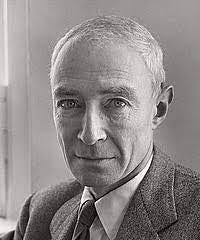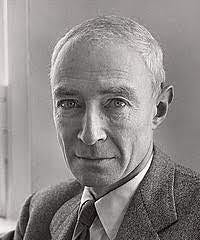I finally saw Oppenheimer yesterday, taking in the three-hour film with my younger daughter, who loves film in general. To be clear, I love Nolan’s work and liked Oppenheimer very much (I’m still digesting it). Nolan’s films are pristine in terms of cinematography, editing, and story—I cannot find the right word for this, but to see a Nolan film and juxtapose it with another’s work can be a disservice, as anything else often looks “untidy” by comparison. Going to a Nolan film is like going to an art exhibit of photorealistic work and not knowing it; you forget the medium and believe you are viewing the best photos ever taken.
Nolan’s films vividly accentuate another quality—the world of men. Oppenheimer is no exception, and I will not mince words: the film is about men doing men things and unleashing their men-made ideas and physical manifestations upon the world just because they can.
Here is a list of Christopher Nolan’s films (I will omit Insomnia, which he directed but did not write), and if you’ve seen them, ask yourself which film you would particularly associate with female characters and their actions, or female historical figures and their impact on the world:
Following (1998)
Memento (2000)
Batman Begins (2005)
The Prestige (2006)
The Dark Knight (2008)
Inception (2010)
The Dark Knight Rises (2012)
Inserstellar (2014)
Dunkirk (2017)
Tenet (2020)
Oppenheimer (2023)
Also of note: Nolan has a writing credit for Man of Steel, so his superhero fascination extends to the genre’s two greatest male icons—Batman and Superman.
Christopher Nolan likes to make films about ideas, about concepts he believes are important (the Batman films might be an exception), and about puzzles as applied to what we perceive and define as reality. Based on his filmography, I think it is fair to say that women do not occupy the center of his camera’s viewfinder. My favorite Christopher Nolan film is Interstellar, which happens to be the only Nolan film with multiple, meaningful female characters. The daughter, Murph (played by multiple actresses), and Brand, played by Anne Hathaway, are vital to the film’s progress—they are not purely peripheral or dedicated love interests. Nolan’s only film named after and focusing on place (Dunkirk) is a male-centered battlefield (even though there were exceptions, the UK did not deploy female soldiers abroad until the 1991 Gulf War, and Germany did not have a woman join a combat unit until 2001).
One way to look at this is to criticize Nolan and ask, “Have you considered making at least one film with a female lead?” Generally, this has been done enough and I don’t need to add my voice to that chorus. Another perspective might be, and this feels especially accurate for Oppenheimer, is that Nolan is representing a version of the truth—decision-making and power structures dominated by men often visit terrible consequences on our world. I did not leave Oppenheimer interpreting Robert Oppenheimer as a hero, and I don’t believe that is what Nolan wanted. I believe what I am to leave with is a confusing combination of hubris, second-guessing, regret, and a crystal-clear view of power structures that, while male-dominated, often devour the men within them in order to liberate people who are willing to take all of our worst creations and make them operational. And its effects are long lasting, as it was only just over six months ago that Oppenheimer’s name was “cleared.” Heck, someone like Martin Heidegger may have rightly fallen out of fashion, but his theories on technology and the reality of his power and long-standing influence are undeniable—maybe Nolan knows and is haunted by such things. You can consume a television show like For All Mankind and watch women thrive in what is literally an alternate history, or you can see Christopher Nolan films like Oppenheimer and watch Florence Pugh’s enormous talent be almost entirely reduced to her bare body.
Let me course correct, as I am getting off track. In thinking of another historical horror and tragedy, I have spent a lot of time reading about the Rwandan genocide. Like many, I was following the news reports and the Frontline documentary Ghosts of Rwanda profoundly impacted me (I watched it the night before a job interview and slept for zero hours). One of the fascinating post-genocide currents was Rwanda’s understanding that it needed to involve women, a lot more women, in decision making, and thus their 2003 constitution required that 30% of elected positions be occupied by women. 50% of the seats in parliament went to women that year, and in 2013, 64% of the pariliamentary seats were held by women—the largest percentage of female governmental representation in the world. This is not even accounting for the fact that, with so many men killed in the genocide, women led the entrepreneurial revival of the country’s most important export: coffee. Women assumed control of many of Rwanda’s coffee plantations and, frankly, were better at it.
As I said at the beginning of this post, I love much of Christopher Nolan’s work; he is a director I would drive to the cinema for just because it was a film he directed (like I would for Jordan Peele or Greta Gerwig). But I find myself caught between two poles of thought, and framing this as a dichotomy is likely my own limitation. Is Christopher Nolan simply a writer and director who always imagines a man’s world? Or is he trying to show us the realities of a man’s world and its often-terrifying results? I am inclined to think it’s both: he has yet to be interested in telling stories that feature women, yet he possesses a pointed brilliance for puzzles that hinge not only on the limitations of men, but often the very few among those men who can glimpse that their stars are repeatedly collapsing into themselves.





As creators, we mostly explore from our own perspectives and interests, which is what Christopher Nolan does in his work. But this is also why it's SO important that LOTS of different types of people are creating, and why we need more women directors and people of color directing and especially women of color directing.
All of this, but especially Florence Pugh.